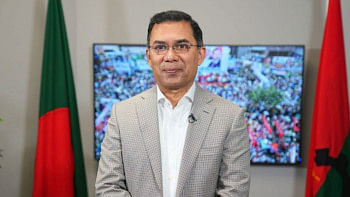Bangladesh’s quest for a corruption-free tomorrow

In more than five decades of independence, Bangladesh has made little progress in tackling corruption. The country continues to perform poorly in corruption indices, reflecting its status as one of the most corrupt nations globally. Corruption has turned more and more pervasive over time, engulfing politicians, civil and military officials, businesspeople, and law enforcement. Over the 15-plus years of the previous government, it intensified in both scope and scale, with no significant measures taken to address it.
Corruption manifests in various forms—such as bribery, favouritism, and embezzlement—and is experienced firsthand by ordinary citizens, entrepreneurs and investors. Government services, for example, have become inaccessible without paying bribes. Services and tasks at public offices are delayed regardless of their merit as "facilitation fees" or "speed money" have become the norm. Over time, these under-the-table transactions have become a standard practice for accessing public services in Bangladesh. This practice not only burdens honest citizens, but also creates opportunities for dishonest individuals.
Corruption is self-reinforcing—one instance leads to another. In the past, the authorities issued licences, permits and contracts in exchange for bribes. As a result, opportunities were often given to unqualified entities, resulting in poor service delivery as their sole aim was to maximise profits through fraudulent means. While the exchange of money between individuals may not directly affect economic growth as long as it is within the economy, the collapse of a bridge or building due to substandard construction materials results in both economic losses and the tragic loss of human lives. Similarly, when project costs escalate beyond initial estimates, citizens bear the financial burden through increased tolls and taxes. The Padma Bridge is an example of a project completed at a much higher cost than originally projected. Indeed, megaprojects became a large source of overspending through various means. The interim government is reviewing the megaprojects including Payra port, Matarbari thermal power plant, Rooppur Nuclear Power Plant and Dhaka metro rail as huge amounts of money have been spent on these.
Corruption also discourages private sector investment by creating uncertainty and raising operational costs. Genuine investors often face barriers in obtaining the necessary permits and approvals. High facilitation fees reduce competitiveness, favouring those with privileged access. For example, businesses that acquire prime land at low prices or receive utilities through informal payments enjoy a competitive advantage over those operating by market rules. Companies forced to pay high bribes for gas and electricity connections struggle to compete. This discourages innovation, job creation, and productivity—key drivers of national economic growth.
Corruption also carries significant social and environmental costs. When the government fails to raise adequate revenues through taxation, it lacks the resources to fund essential social protection programmes for vulnerable communities. Environmental degradation occurs when corrupt practices allow illegal encroachment of rivers and forests. Unfit vehicles are allowed on the streets through bribery and contribute to severe pollution, harming public health and reducing worker productivity. These conditions increase public expenditure while simultaneously lowering the country's overall economic output.
Addressing corruption requires decisive actions. Systems must be made more accountable and transparent, with digital governance playing a vital role in achieving these goals. Punishing corrupt practices, upholding the rule of law, and ensuring the protection and motivation of honest officials are critical components of the fight against corruption.
However, corruption also presents a deeper challenge—a moral hazard. When corruption remains unchecked, it emboldens more individuals to engage in it, while others become demoralised and disengaged. Large-scale financial crimes, such as syphoning off public funds from banks by becoming wilful bank defaulters, have gone unpunished in the country so far. This sends the message that such offences carry little consequences. Public perception shifts as wealth amassed through corruption becomes a source of influence, with corrupt individuals attending high-profile events and gaining social acceptance.
Eliminating corruption requires a comprehensive improvement in governance across all sectors. Institutional reforms are vital to achieving sustainable progress. Although Bangladesh undertook economic reforms in the 1990s to liberalise the economy, it failed to strengthen governance institutions at the time. Subsequent regulatory and institutional reforms, including in the banking sector, have been limited in scope and impact. Reforming public administration remained an unfinished agenda as well; meaningful action in this sector was limited to introducing new pay scales for government officials. Establishing accountability within public institutions is the most critical step towards curbing corruption.
A key area for reform is strengthening the Anti-Corruption Commission (ACC). Established in 2004 under donor pressure, the ACC was intended to operate independently. However, successive governments have not provided the institution with the necessary legal, administrative or financial support to function effectively. Political interference continues to constrain its autonomy. Though government plans, such as five-year policy frameworks, have called for empowering the ACC, these commitments have not materialised.
The interim government has formed several commissions to introduce reforms in various important sectors. The commissions to reform the ACC and public administration are crucial for tackling corruption in the country.
So far, Bangladesh's economic development has largely progressed independently of governance improvements. But sustained and inclusive growth requires addressing corruption to enhance the efficiency of development efforts. Without rooting out corruption, the wheels of progress will remain stalled. Effective governance reforms are crucial to realise the full potential of Bangladesh's economy and securing a prosperous future for all.
Dr Fahmida Khatun is executive director at the Centre for Policy Dialogue (CPD) and non-resident senior fellow of the Atlantic Council. Views expressed in this article are the author's own.
Views expressed in this article are the author's own.
Follow The Daily Star Opinion on Facebook for the latest opinions, commentaries and analyses by experts and professionals. To contribute your article or letter to The Daily Star Opinion, see our guidelines for submission.

 For all latest news, follow The Daily Star's Google News channel.
For all latest news, follow The Daily Star's Google News channel. 









Comments